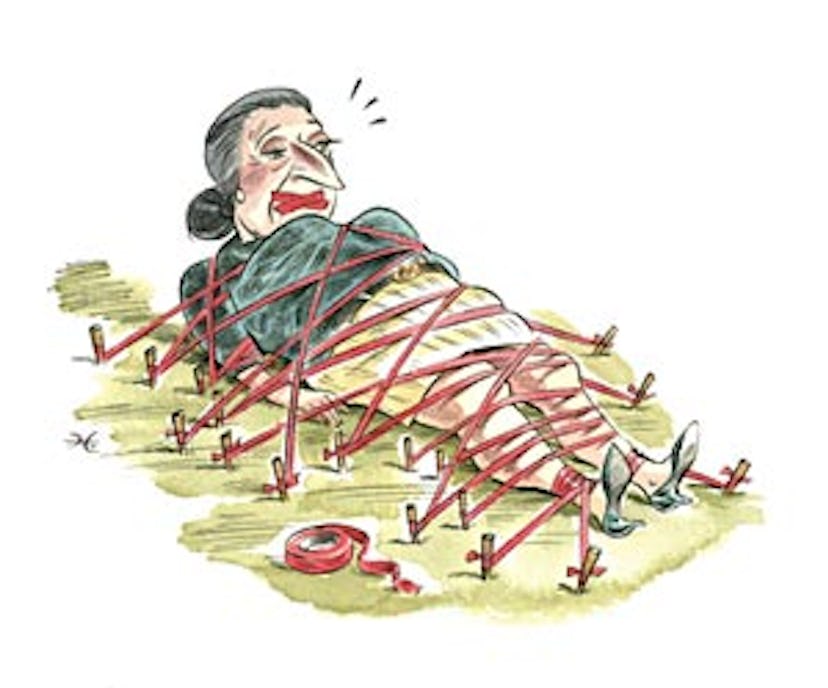Beware the Bureau-tocracy
As she ponders the new functionaries and regulations, the Countess’s crush on Obama could be fading.

First we talked about change, but now it seems we’re in an era when the Democratic party, to quote David Brooks of The New York Times, is “swept up in its own revolutionary fervor—caught up in the self-flattering belief that history has called upon it to solve all problems at once.”
As I sat there reading Brooks’s column in my schloss high in the snow-clad Austrian Alps, I wondered what all this adds up to besides money—trillions at the moment and possibly quadrillions. Bureaucracy and more bureaucracy, I fear.
Desperate to stay upbeat in these difficult times, I’m trying not to grumble too much about the new bureau-tocracy sweeping the world. And I’m sure, dear reader, you don’t want to be bored by politics.
But when I read Thomas Friedman’s column in the Times about all the new “super (sub) secretaries,” I couldn’t help but get upset. When there’s a problem in a far-off land, the Obama administration’s answer seems to be to appoint a super sub-secretary and then another one and another one, each with his or her own bureaucratic baggage. Soon the president is going to need a GPS device just to keep track of them all (not to mention an Ego Monitor). Take Hillary Clinton. On her tour of the Middle East, she was waving like the Queen of Bureaucratic Royalty.
The last thing the world needs right now is more bureaucrats bumbling around and developing new regulations. When you read that Americans are destroying the environment by using toilet paper that’s too soft, you really have to wonder what’s going on. What’s left—leaves? (Of course, I do know an English gentleman whose eco-conscious daughter-in-law banned toilet paper from her house. I didn’t comment, or use the loo.) Then there’s the smart New York restaurant that had to submit to a state food inspector taking the temperature of the chickens. No, they didn’t have a fever—and they were served immediately.
The recession clearly isn’t stopping our elected representatives from grabbing as much as they can. Senator John McCain railed against this behavior on the Senate floor, trying to eliminate 9,000 earmarks, totaling $7.7 billion, from the Obama budget—before he was voted down by his colleagues. Among the vital things saved were $2.1 million for the Center for Grape Genetics in New York, $1.7 million for pig odor research in Iowa and $1 million for Mormon cricket control in Utah. (It wasn’t clear whether the crickets were Mormons, or if the aim was to control Mormons playing the game of cricket.)
To the bureaucrats (who in the European Union can’t be fired), the crazy sums don’t seem to matter. A friend of mine was once in D.C. during budget time and overheard two Burberry raincoat–clad bureaucrats talking about the process. “So, is your program going to make it?” one asked the other. “I certainly hope so,” the other replied. “It’s only a billion dollars.”
Only?
Some have seen a business opportunity, of course. Donald Trump, for example, recently bought an 800-acre golf club near Sterling, Virginia. “The reason I did it is I see Washington [D.C.] as the only growing place in the United States,” he explained to CNBC. “They’re going to own the banks; they’re going to own the car companies; they’re going to own everything. So I figured I may as well buy a lot of land right by Washington.”
Trump may be on to something (his casino group has filed for Chapter 11 bankruptcy, though). But I’m glad there’s at least one sector too egocentric, too divisive and, sometimes, too creative for any government to nationalize: the fashion industry. Face it, people don’t all want to look the same—even though when I received a rare invitation to visit China in the days of Mao, I thought the women and men looked chic in their Mao jackets. But even more beautiful were the women in Shanghai in their floral dresses on a warm summer’s day.
So it’s up to fashion to save us all from being nationalized in this sprawling bureau-tocracy. Then again, perhaps we should really start to worry when the fashion world starts looking sane compared with everyone else.